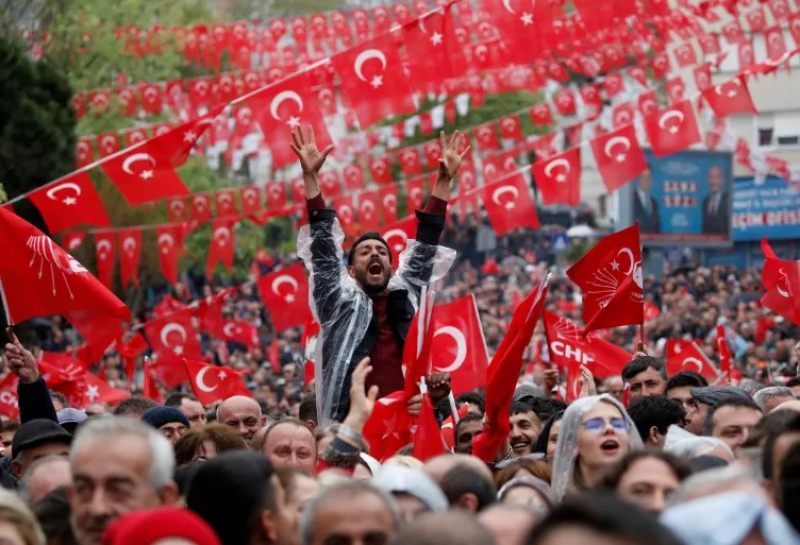- Gaza Ceasefire Not Enough as Children Continue to Die |
- Bangladesh Sets Guinness Record With 54 Flags Aloft |
- Gambia Tells UN Court Myanmar Turned Rohingya Lives Hell |
- U.S. Embassy Dhaka Welcomes Ambassador-Designate Brent T. Christensen |
- Survey Shows Tight Race Between BNP and Jamaat-e-Islami |
Turkey’s foreign policy: From past to potential post-Erdogan era

Supporters of main opposition alliance during a rally
In August 2019, after inspecting the cockpit of Russia’s then-new fifth-generation Su-57 fighter warplane, Turkish President Recep Tayyip Erdogan asked his Russian counterpart, Vladimir Putin, if it was for sale.
“Yes, you can buy it,” Putin responded with a smile, as he enticed Erdogan with Russia’s latest foreign jets at the MAKS-2019 international air show outside Moscow.
The duo, donned in dark suits and dark shades, toured other warplanes and then took a break to eat ice cream cones, reports Al Jazeera.
“Will you pay for me?” Erdogan asked Putin, nodding towards the cones, to which Putin responded, “Of course, you’re my guest”.
The exchange exemplified the renewed closeness of Turkish-Russian security relations after a difficult period, during which Turkey downed a Russian fighter plane that it said had strayed across the border from Syria. But it also showcased Erdogan’s personality-driven approach to foreign policy during his two-decade rule.
As Turkey has sought to position itself as a regional heavyweight, the Justice and Development Party, or AK Party leader’s confident, if confrontational, style has shaped the country’s international relations.
Turkey has certainly grown more influential – not just across the Middle East, but also Africa and Europe, with its prominent role in mediating between Russia and Ukraine a particular example.
But a possible new successor is on the rise, with emboldened opposition leader Kemal Kilicdaroglu from the Republican People’s Party, or CHP currently holding an edge in opinion polls.
Kilicdaroglu, a social democratic politician also backed by five smaller parties in an alliance against Erdogan, has promised to overturn the president’s legacy.
Sinan Ogan from the ATA alliance is also vying for the top spot. A former candidate, Muharrem Ince from the Homeland Party dropped out of the race just three days before the election.
So, Turkey may enter a post-Erdogan era after Sunday’s presidential and parliamentary elections, and that could mean foreign policy changes.
Personality-driven to predictability?
If Erdogan’s reign was about pomp and personality, the opposition’s – especially under Kilicdaroglu – may be more muted and predictable.
“The style of foreign policymaking will change and that’s more important than issue-based changes because currently foreign policy is conducted entirely [in] a personalised manner,” Salim Cevik, a researcher at Stiftung Wissenschaft und Politik’s Center for Applied Turkey Studies in Berlin, Germany, told Al Jazeera.
Under Erdogan, foreign ministers and diplomats have largely been excluded from decision-making, with personal relations between the president and foreign leaders waging a far greater role, Cevik added.
“Turkey will be much more predictable because it will be more institutionalised,” the researcher said.
Sami Hamdi, the managing director at International Interest, a political risk firm focusing on the Middle East, said that Erdogan’s policies are also aimed at increasing Turkey’s soft power, particularly in the Muslim world, a continuation of the legacy of the Ottoman Empire, which ruled vast swaths of the Middle East, North Africa and the Balkans for centuries.
“Erdogan’s assertive nature has irked the major powers who are more accustomed to Turkey’s historical role as a supporting actor,” Hamdi told Al Jazeera.
“At the same time, Turkey’s rapidly expanding influence is rooted in Erdogan’s ability to capitalise on Islamic soft power via his ‘Muslim’ rhetoric, enabling him to advance rapidly both politically and economically into [multiple regions],” he added.

